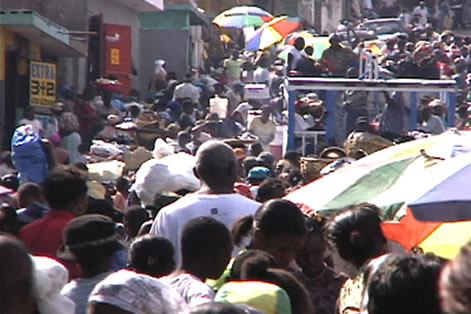 |
||
 |
||
Issue Number 27 - January 30, 2003
Desegregating U.S. African policy
Haitian poor ignore capital "strike"
A more colorful anti-war movement
Printer Friendly Version
Note: The size of the type may be changed by clicking on view at the top of your browser and selecting "text size". The document will print in the size you select.
The anti-war coalition A.N.S.W.E.R. is rallying its African American troops, heavily represented on the speakers' platform at the huge demonstration in Washington, January 18, but far less visible in the ranks. In an "Open Letter to the Black Community," A.N.S.W.E.R.'s Black contingent encouraged community organizations to transform Black History Month into a Black Protest for Peace Month.
"Black history is nothing if not a history of struggle against what Dr. King called the three evils: racism, poverty, and militarism," said the letter, proclaiming, "It's time to maximize Black participation in the peace movement."
People of African ancestry have a unique role in the growing movement to stop President Bush's war on Iraq. If war comes, it will be Black soldiers who will bear the brunt of the fighting and dying. The Black community will bear more than its share of deprivation as a result of massive funds invested in war, money that is robbed from healthcare, education, nutrition, and jobs programs. War is the epitome of everything that Dr. Martin Luther King Jr. fought against his entire short life. And stopping the war on Iraq is a matter of life and death for everyone, especially people of color. In the coming days and weeks, let us work to insure maximum participation from the Black community in the peace movement and in all the important protests, especially the International Day of Protest for Peace, February 15th.
A.N.S.W.E.R. stands for Act Now to Stop War and End Racism. The coalition also supports a "Remember Malcolm X" student protest, February 21, in commemoration of the 38th anniversary of the Black leader's assassination. Students are encouraged to mark the event by "leaving classes to protest the war."
As we reported last week ("An Anti-racist Peace Movement"), A.N.S.W.E.R.'s Black contingent is "a non-sectarian reflection of Black America as a whole." Among the core of organizers are:
Rev. Herbert Daughtry, National Pastor, The House of The Lord Church
Rev. Grayland Hagler, Pastor, Plymouth Congregational Church, Wash. DC
Brenda Stokely, President, AFSCME Council 1707 New York
Mumia Abu-Jamal, death row political prisoner, journalist
Mahdi Bray, Executive Director, Muslim American Society Freedom Foundation
Charles Barron, Council Member, Brooklyn, NY
Dennis Serrette, Educational Director, Communication Workers of America
Consuela Lee, musician, director, Snow Hill Institute of Cultural Arts and Heritage, Snow Hill, Alabama
Viola Plummer, December 12 Movement
Abayomi Azikiwe, Editor, Pan African News Wire
Elizabeth Davis, Washington DC Teacher Federation
Larry Holmes, ANSWER
Cynthia McKinney, Former Congresswoman, GeorgiaTo view the current list of signers or add your signature to the open letter to the Black community, visit the following A.N.S.W.E.R. Website page by clicking on the link below:
http://www.internationalanswer.org/news/update/012903BlackCommunityAppeal.html
Foreign policy segregation
The bizarre and numbing protocols of American racism have led Democratic and Republican Presidents to believe that they were doing Blacks a favor by throwing African policy initiatives into a common, "Black" domestic-foreign political package. It seems to have never occurred to them that the practice is an insult to both Black Americans and Africans on the continent. In the broad scope of U.S. foreign policy, Africa is a ghetto.
"Historically, the U.S. has segregated Africa within foreign policy," said Salih Booker, executive director of Africa Action, at a Washington news conference. "Now, Washington must move African concerns from the margins of U.S. foreign policy to the center, if it is to sharpen its focus on the most destabilizing international threats and the most urgent global priorities."
Booker announced the release of a report, "Africa Policy for a New Era: Ending Segregation in U.S. Foreign Relations." He was joined by Marie Clarke, National Coordinator of Jubilee USA Network, and Adotei Akwei, Africa Advocacy Director of Amnesty International USA.
"Africa's massive external debt is the single largest obstacle to the continent's efforts to fight poverty and defeat HIV/AIDS," said Ms. Clark. "Millions die while our Administration withholds life saving debt cancellation." Clarke described the debt burden as "a major source of global inequality, which U.S. policies must address."
Amnesty International's Adotei Akwei called on Washington to withdraw support from repressive African regimes. "The U.S. pre-occupation with the geo-strategic value of African countries in the 'war on terrorism' must not trump efforts to promote human rights and advance democracy," he said.
"Striking" at Haiti and Venezuela
Among the myriad destabilization tools of U.S. foreign policy is the capital "strike." Globally, the American-dominated International Monetary Fund and the World Bank bludgeon nations into submission. For more fine-tuned economic torture, local elites are encouraged to wreck their own economies, thus fomenting opposition to governments objectionable to Washington.
Since early December, Venezuela has been under siege by a local capital strike combined with management-led disruptions of the oil industry, aimed at bringing down the government of President Hugo Chavez.
Haiti, however, is the poorest nation in the Western Hemisphere, with very little economy to disrupt. The U.S. has successfully blocked international aid to the country in an attempt to pressure President Jean Bertrand Aristide into compliance with Washington's dictates - yet Aristide hangs on. Last week, Haiti's tiny elite played the Venezuela card, declaring a national "strike." In a piece filed with the San Francisco Bay Area Independent Media Center, Kevin Pina reported:
Although not officially behind [the] general strike, the Washington backed Democratic Convergence continued calling for Aristide's resignation while demanding Haitians respect the strike in support of the new "civil society" group claiming to represent "all sectors of Haitian society." While tacitly accepting support from the Convergence, the "civil society" organizations insisted it was not their goal to force Aristide's resignation. This appeared at odds with their simultaneous claims that the government no longer enjoys credibility with a majority of the Haitian people. As one Lavalas insider summed it up, "They are supporting the premises of the Convergence [about Aristide and Lavalas] while saving the option of dramatically calling for his resignation at a later date. They think this will give them greater credibility and effectively isolate middle-class support away from Lavalas. They are talking out of both sides of their mouths."
Most banks, gas stations, supermarkets and specialty shops kept their doors closed today which stood in stark contrast to the bustling activity in the marketplaces of the poor. "Only those who have money and can afford to stay closed are behind this strike," stated one woman as she paused from bickering with a customer over the price of carrots.
Foreign owned businesses such as Dominoes Pizza and Shell Gas closed their doors to support a general strike against Haitian President Aristide. This stood in stark contrast to the bustling activity in the markets of the poor majority as the photographs below illustrate.
Which seems to show that, in a country with very little capital, the capital "strike" is an empty threat.
www.blackcommentator.com
Your comments are welcome. Visit the Contact Us page for E-mail or Feedback.

